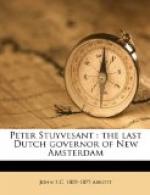As the Nassau came in sight of this lonely trading port suddenly the peals of the Dutch trumpets awoke the echoes of the forest. It was the 4th of October. A letter was immediately dispatched by a fleet-footed Indian runner to Plymouth. A boat was promptly sent to the head of the creek, called Manoucusett, on the north side of the cape, and De Rassieres, with his companions, having threaded the Indian trail through the wilderness for five miles, was received on board the Pilgrims’ boat and conveyed to Plymouth, “honorably attended with the noise of trumpeters."[2]
This meeting was a source of enjoyment to both parties. The two nations of England and Holland were in friendly alliance, and consequently this interview, in the solitudes of the New World, of the representatives of the two colonies, was mutually agreeable. The Pilgrims, having many of them for a long time resided in Holland, cherished memories of that country with feelings of strong affection and regarded the Hollanders almost as fellow-countrymen.
But again Governor Bradford asserted the right of the English to the country claimed by the Dutch, and even intimated that force might soon be employed to vindicate the British pretentions. We must admire the conduct of both parties in this emergency. The Dutch, instead of retaliating with threats and violence, sent a conciliatory memorial to Charles I., then King of England. And Charles, much to his credit, issued an order that all the English ports, whether in the kingdom or in the territories of the British king, should be thrown open to the Dutch vessels, trading to or from New Netherland.
The management of the affairs of the Dutch Colony was entrusted to a body of merchants called the West India Company. In the year 1629, this energetic company purchased of the Indians the exclusive title to a vast territory, extending north from Cape Henlopen, on the south side of Delaware Bay, two miles in breadth and running thirty-two miles inland.
The reader of the record of these days, often meets with the word Patroon, without perhaps having any very distinct idea of its significance. In order to encourage emigration and the establishment of colonies, the authorities in Holland issued a charter, conferring large extents of land and exclusive privileges, upon such members of the West India Company as might undertake to settle any colony in New Netherland.
“All such,” it was proclaimed in this charter,
“shall be acknowledged Patroons of New Netherland, who shall, within the space of four years, undertake to plant a colony there of fifty souls upwards of fifteen years of age. The Patroons, by virtue of their power, shall be permitted, at such places as they shall settle their colonies, to extend their limits four miles[3] along the shore, and so far into the country as the situation of the occupiers will admit.”
The patroons, thus in possession of territory equal




